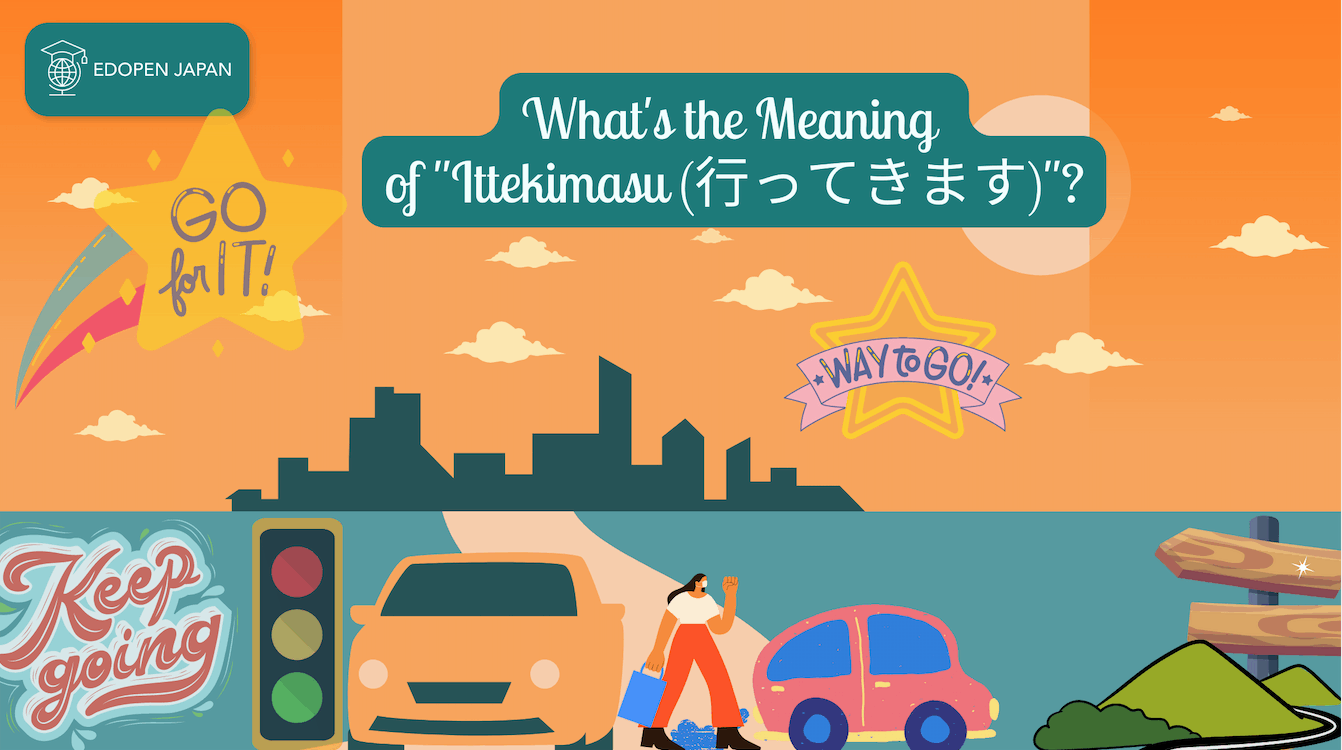Greetings play an important role in every culture. I would say that greetings are the link between people. Either giving greetings or receiving greetings from others can warm my heart.
The Japanese word for greeting is “aisatsu”, and many of you may already know some of the common greeting phrases such as “ohayou gozaimasu” or “konnichiwa”. However, in Japan, “aisatsu” is not just about saying hello, it is more about showing respect or politeness.
Today, we are going to introduce a common fixed phrase that people use in everyday life ー “ittekimasu”.
In this article, you will learn the meaning, pronunciation, when to use, and response for “ittekimasu”. Finally, there are two conversations at the end of the article!
In addition, a phrase that you’ll often hear alongside ittekimasu, but which has the opposite meaning and use, is tadaima (ただいま). Read more about “tadaima” below:
Read Also:
All You Need to Know about “Good Bye or Sayonara (さよなら)”
Everything You Need to Know about “Daijoubu (だいじょうぶ)”
What is the Meaning of “Hajimemashite (はじめまして)”?
Contents
Brief Overview of “Ittekimasu”

“Ittekimasu” is a phrase in the formal present tense, usually written as “いってきます”, “行ってきます”, or “行って来ます” with kanji or only with hiragana.
The very first thing you need to know is that “ittekimasu” is used by the person who is leaving from a place.
“Ittekimasu” can be literally translated as “I am leaving now and will be back”. The informal present tense form is 行ってくる(ittekuru), which is often used when talking to close friends and family.
While “ittekimasu” is often used to let your family know that you are leaving home for other places, it can also be used when you are leaving from anywhere to other places. In this case, we can also consider that the meaning of “ittekimasu” is similar to “see you later” in English.
Although we can easily translate the phrase literally into English, there are other meanings behind the words with the spirit of the Japanese. Sometimes, apart from simply informing the people left behind that you are going out, “ittekimasu” can also convey your feelings with messages such as “I’ll be back”, “wait for my return”, depending on the situation.
The Etymology of the Word “Ittekimasu”
Let’s break it down into two parts, “itte” and “kimasu”, and see how it’s formed!
(1) 行って (itte)
This part originally comes from a verb, 行く (iku), which 行って (itte) is the -て (te) form of the verb “iku”.
The basic definition of 行く (iku) is “to go” and is used when you are talking about moving from one place to another. Since this is one of the first verbs taught to students of Japanese, let’s look at the most common uses of this verb.
| Japanese | English | |
| formal present form | バスで学校に行きます (basu de gakkou ni ikimasu) | I go to school by bus. |
| informal present form | 歩いて学校に行く (aruite gakkou ni iku) | I go to school on foot. |
If you have not yet learned the grammar of the -te form, let me give you a simple explanation of this frequently used grammar.
In this phrase “ittekimasu”, the -te form plays the role of a simple conjunction in a sentence. The function of the -te form is to express sequential order and to connect clauses. To simplify, the use of -te form here can be thought of as the meaning of “and”. Of course, there are many other uses of this grammar, each of which has a different meaning.
(2) きます (kimasu)
This part comes from the verb, くる (kuru), which きます(kimasu) is the ます (masu) form of the verb “kuru”.
The literal meaning of くる (kuru) is “to come”. This refers to the action of returning in “ittekimasu”.
As the verb “kuru” is an irregular verb, it can be a bit difficult for a beginner to recognise the conjugated form from the dictionary form when conjugating.
How to Pronounce “Ittekimasu”?
To pronounce it correctly, we should pay attention to the pronunciation of 行って (itte). We can find that there is a “っ” in the word, which is called “small tsu” or “silent tsu”. “っ” is derived from “つ (tsu)”, but we don’t have a sound for “っ”.
When we have “small tsu” between words, we should pause. Take 行って(itte) for example, we can consider each character as a syllable. In this case, 行って is made up of three syllables, and we need to pause for one syllable between 行 and て.
How to Use “Ittekimasu” Properly?

Whether you are studying, working or travelling in Japan, I am sure you will use this phrase at least once a day. Let me list some of the common occasions when you can say “ittekimasu”.
At home…
- When you go shopping, you come back very quickly or within hours.
- If you go to school/work, you will come back in a day.
- If you are going away for a few days.
- If you are leaving for years to study / work / travel in another city or even another country.
While ittekimasu is most commonly used when you plan to return in a short period of time, it can also be used when you leave a place for years. As long as you have a plan to return, “ittekimasu” can be taken to mean that you promise to return in the future.
At workplace…
- If you are going to visit clients / get some food downstairs… and you are coming back very quickly or in hours before you finish work.
At a hotel or other accommodation …
- When you go sightseeing.
- If you are going to eat/get food nearby.
Apart from the examples above, what else can you think of that might give you the chance to say “ittekimasu”?
When Shouldn’t You Say “Ittekimasu”?

Although we have learnt when to use ittekimasu, there are still some situations where it is inappropriate to use it. To avoid misusing the phrase, please see the example below.
- When getting off from work.
- When leaving someone’s home.
- When leaving from a store / restaurant.
- When checking out from a hotel.
What is the Answer to “Ittekimasu”?
(1) いってらっしゃい (itterasshai)
The literal translation is ‘go and come back’. It is normal for the translation to sound unnatural, as the differences between cultures always have an impact on languages. The meaning of “Itterasshai” is close to “see you later”.
One of the things that makes Japanese interesting is that there are many other meanings behind some expressions. By discussing “itterasshai” in different situations, we can find that the messages it conveys are more than just “see you later”.
- Be safe on the way.
- Have a nice day!
- Have fun!
- I will be waiting for you.
The Expression with “Ittekimasu”

As well as using “ittekimasu” as a single, fixed sentence, we can also add another sentence before “ittekimasu” to make it clear to others where you are going or what you are going to do.
The structure is as follows:
『 The destination / purpose of movement 』 + に (ni) + 行ってきます
and に (ni) is a particle that indicates purpose.
This part, which describes the purpose of the movement, can be a noun or a phrase with a verb. The verb here must be in the stem form, also known as the -masu form, but without the -masu suffix. Let’s have a look at some examples.
- 学校に行ってきます。
I am going to school. - ちょっとトイレに行ってきます。
One minute, I need to go to the bathroom. - 図書館に勉強しに行ってきます。
I am going to library for studying.
The Conversation of Ittekimasu
(Tom and Mary are husband and wife.)
Tom::あ、時間がない。会社に行かないと!
Ah! I am running out of time. I must be off to work!
Mary:忘れ物ないようにしてね。
Make sure you have everything with you.
Tom:はい、行ってきます。
Yes, I’m going.
Mary:行ってらっしゃい。
Have a good trip.
(John and Joy are roommates. Joy is off for a job interview.)
Joy:面接に行ってきます。
I am going to have a job interview.
John:あ、頑張てね!
Ah! Do your best!
Joy:ありがとう。行ってきます。
Yes, I’m going.
John:行ってらっしゃい。
Have a good trip.
Summary
From the above conversations, what do you think is the meaning of “ittekimasu” and “itterasshai” behind “see you later”? I am sure the answer will vary from person to person. Next time you have the opportunity to use these phrases, please try to “feel” them!
- “Ittekimasu” is used by the person who is leaving from a place.
- The phrase can be translated literally as “I’m leaving and I’ll be back”. The meaning of the phrase is close to “see you later”.
- “Itterasshai” is the answer to “ittekimasu”.
- You can use “〜 + に(ni) + ittekimasu” to indicate exactly where you are going.













